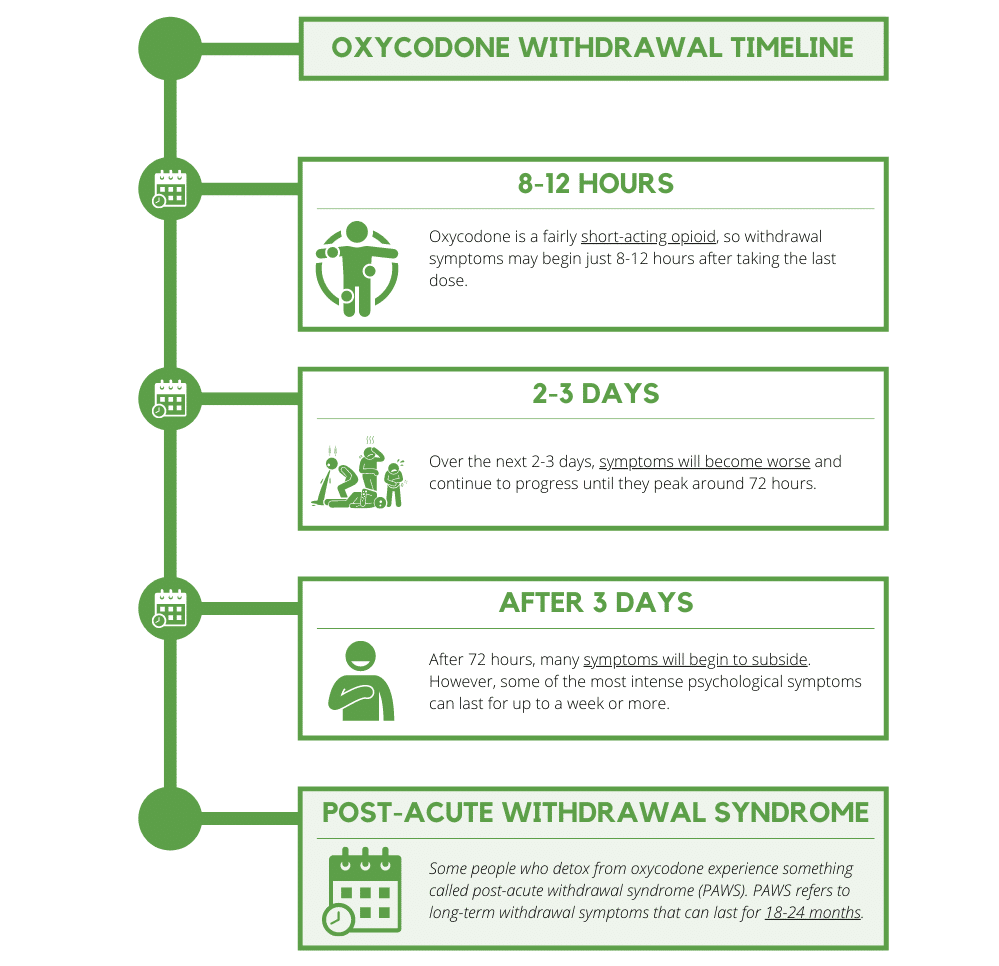Oxycodone Detox: Withdrawal Symptoms and Treatment
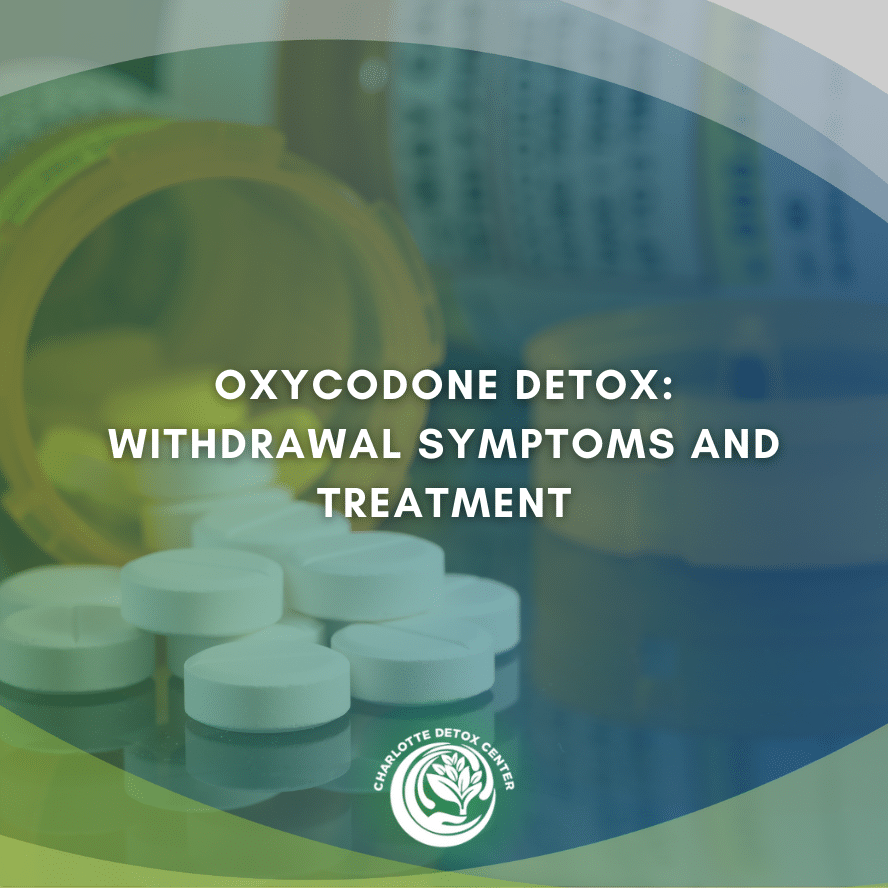
Medically Verified: 2/1/24
Medical Reviewer
Chief Editor

All of the information on this page has been reviewed and verified by a certified addiction professional.
Oxycodone detox centers in Charlotte, North Carolina are equipped with the medications and resources needed to keep patients safe and comfortable as they begin detoxing. When a person who is physically dependent on oxycodone stops using the drug, he or she will experience withdrawal symptoms that can be difficult to cope with without professional help.
Oxycodone is a powerful, semi-synthetic opioid painkiller that is the active ingredient in a host of prescriptions, including Percocet and OxyContin. While these medications are only intended for short-term use, some people end up taking them for a long time or abusing them to get high. The physical dependence on oxycodone can develop in a matter of weeks, and after dependence has formed, many users will continue taking oxycodone simply to feel normal and avoid going into withdrawal.[1]
Oxycodone Withdrawal Symptoms
Symptoms of oxycodone withdrawal are similar to those of other opioid withdrawal syndromes. They often mimic a severe case of the flu.
Symptoms of oxycodone withdrawal that patients may experience during detox include:[2]
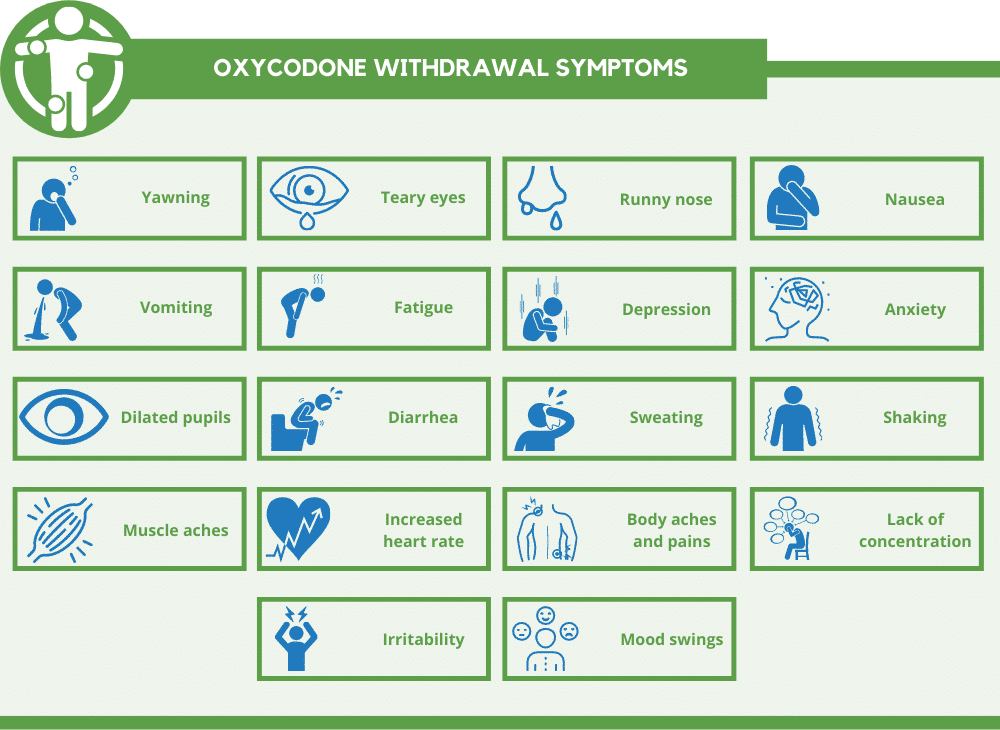
- Yawning a lot
- Teary eyes
- Runny nose
- Nausea
- Vomiting
- Fatigue
- Depression
- Anxiety
- Dilated pupils
- Diarrhea
- Sweating
- Shaking
- Muscle aches
- Increased heart rate
- Body aches and pains
- Lack of concentration
- Irritability
- Mood swings
Even though none of these symptoms are life-threatening, complications can always arise that require immediate medical care. As a result, it’s always best to be safe rather than sorry and detox from oxycodone at a medical detox center in Charlotte, NC.
Oxycodone Withdrawal Timeline
How severe a person’s symptoms become and how long they last will vary from one person to the next depending on a variety of factors, such as:
- How long the person has been taking oxycodone
- How much oxycodone the person is used to taking
- The frequency at which the person takes oxycodone
- Whether or not they are addicted to other drugs or alcohol as well
- Their mental health
- Medical history, age, weight, and metabolism
- The method of administration used (smoking, snorting, injecting, or swallowing)
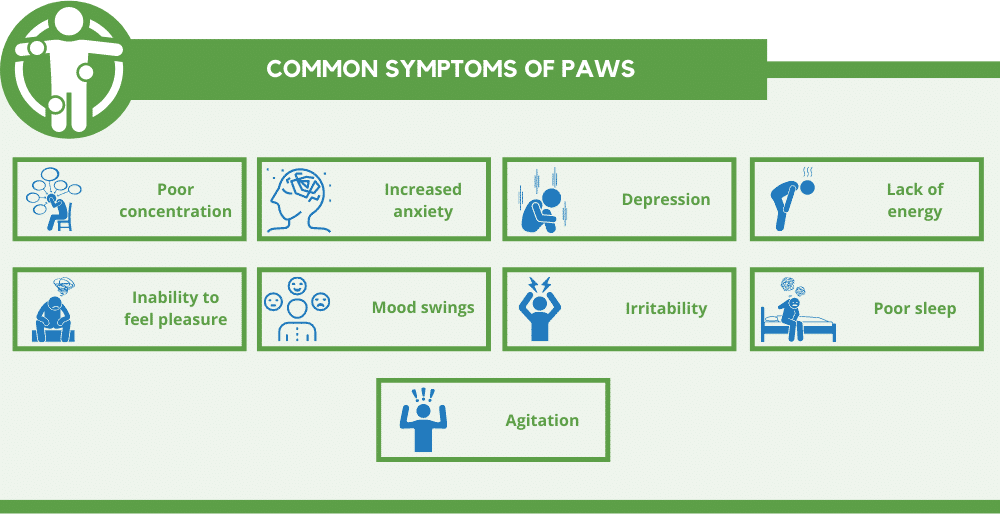
Oxycodone is a fairly short-acting opioid, so withdrawal symptoms may begin just 8-12 hours after taking the last dose. Over the next 2-3 days, symptoms will become worse and continue to progress until they peak around 72 hours.
After 72 hours, many symptoms will begin to subside. However, some of the most intense psychological symptoms can last for up to a week or more.
Some people who detox from oxycodone experience something called post-acute withdrawal syndrome (PAWS). PAWS refers to long-term withdrawal symptoms that can last for 18-24 months.
Common symptoms of PAWS include:
- Poor concentration
- Increased anxiety
- Depression
- Lack of energy
- Inability to feel pleasure
- Mood swings
- Irritability
- Poor sleep
- Agitation
These symptoms can linger for a long time, so they can be difficult to deal with. Fortunately, detox and treatment programs in Charlotte, NC can help teach individuals coping skills to help manage and alleviate their symptoms.
Oxycodone Detox Medications
Oxycodone withdrawal is uncomfortable, at best. While a slow taper, or a gradual reduction, of a person’s dose may be the most effective way to detox, this is best done at an inpatient opioid treatment program.
Opioid treatment programs in Charlotte use medication-assisted treatment (MAT) to help patients overcome their withdrawal symptoms and get started on their recovery. MAT involves counseling, medication, and medical supervision of detoxing patients.
During detox, patients are kept under the careful eye of medical professionals who are prepared to intervene if a complication occurs. Doctors can also prescribe medications that help reduce the severity of oxycodone withdrawal symptoms.
Popular medications used during oxycodone detox include:[3]
- Suboxone – Suboxone is a medication that contains buprenorphine and naloxone. It is known to help reduce cravings and withdrawal symptoms. Suboxone may be used both during detox and during treatment for opioid addiction.
- Clonidine – Clonidine is a blood pressure medication that can reduce symptoms of irritability, anger, anxiety, restlessness, and agitation during the detox process.
- Naltrexone – Naltrexone is used in long-term opioid treatment and maintenance. It helps reduce drug cravings and the risk of relapse. Naltrexone is found in tablet form or in a Vivitrol injection.
Other medications may be administered as needed, such as those for insomnia, mood swings, body aches, or gastrointestinal upset.
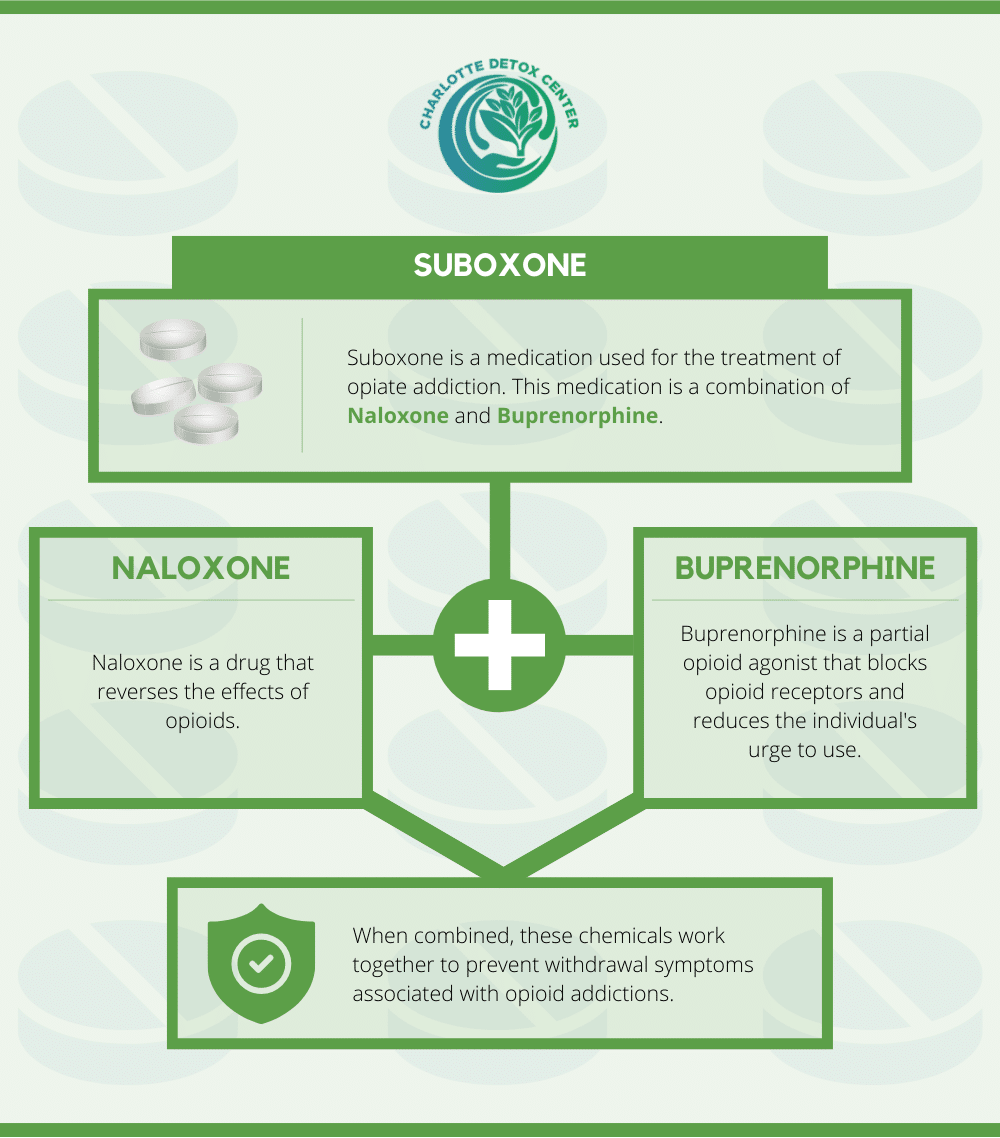
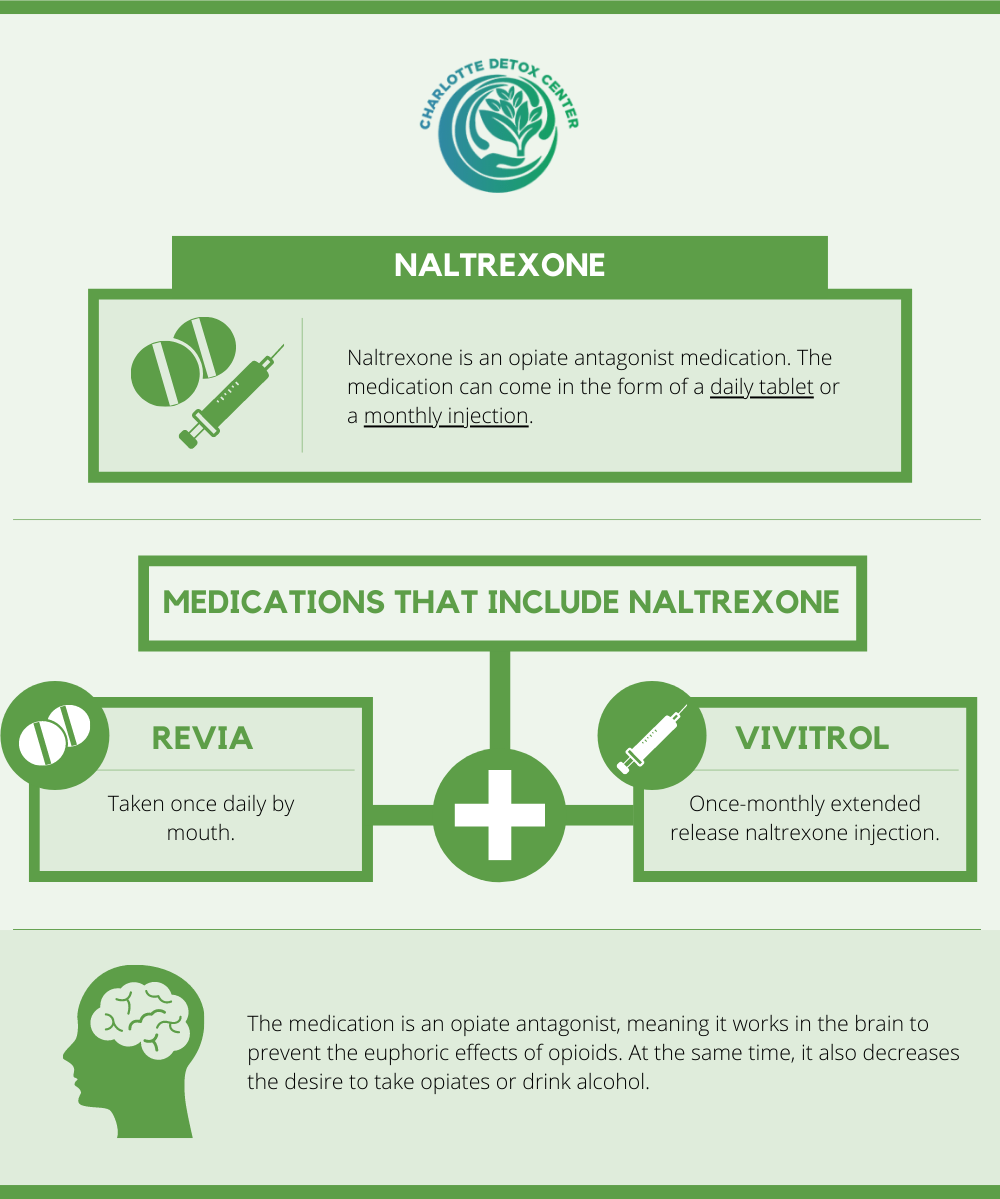
The Importance of Medical Detox for Oxycodone Withdrawal
Oxycodone withdrawal is rarely life-threatening, however, that doesn’t mean complications can’t occur. A mixture of diarrhea, nausea, sweating, and vomiting can lead to dehydration. People who have been mixing oxycodone with other substances, like alcohol, may experience seizures or other potentially fatal symptoms.
Medical detox centers in Charlotte, North Carolina offer around-the-clock care and supervision. This is the safest and most pain-free way to detox from opioids.
Another benefit of medical detox for opioid withdrawal is that detox centers have addiction specialists on-site who can help patients develop a treatment plan for ongoing sobriety. Detox alone won’t cure opioid addiction – it is only the beginning. Instead, most of the healing process happens in rehab with counseling and peer support.
Start Oxycodone Detox in Charlotte, North Carolina Today
Heavy oxycodone users are at-risk of developing severe withdrawal symptoms if they suddenly stop taking the drug. As a result, people who are dependent on oxycodone are encouraged to locate a medical detox center near them.
To learn more about our detox programs or to get started on the journey to recovery, contact one of our dedicated treatment providers today.
References:

